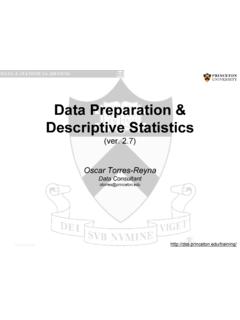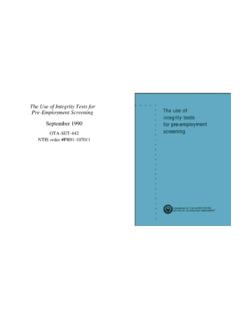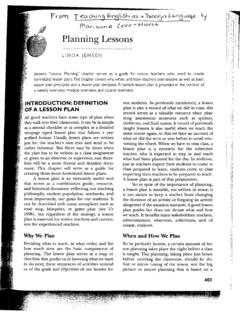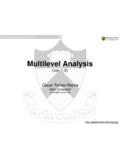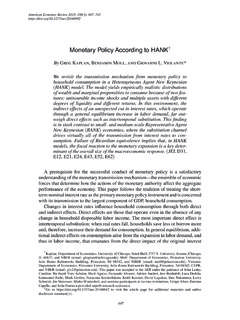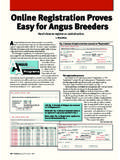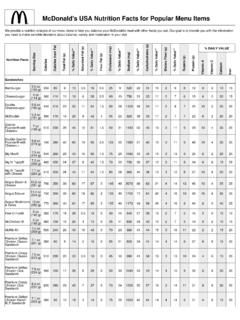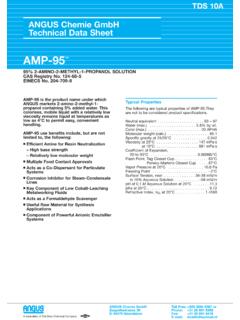Transcription of High income improves evaluation of life but not emotional ...
1 High income improves evaluation of life but notemotional well-beingDaniel Kahneman1and angus DeatonCenter for Health and Well-being, princeton university , princeton , NJ 08544 Contributed by Daniel Kahneman, August 4, 2010 (sent for review July 4, 2010)Recent research has begun to distinguish two aspects of subjectivewell-being. emotional well-being refers to theemotionalquality ofanindividual s everyday experience the frequency and intensity of ex-periences of joy, stress, sadness, anger, and affection that make one slife pleasant orunpleasant. Life evaluationrefers tothethoughts thatpeople have about their life when they think about it. We raise thequestionof whether money buys happiness, separately forthese twoaspects of well-being. We report an analysis of more than 450,000 re-sponses to the Gallup-Healthways Well-Being Index, a daily survey of1,000 US residents conducted by the Gallup Organization.
2 Wefindthat emotional well-being (measured by questions about emotionalexperiencesyesterday)andlifeeva luation(measuredbyCantril sSelf-Anchoring Scale) have different correlates. income and education aremore closely related to life evaluation , but health, care giving, loneli-ness, plotted against log income , life evaluation rises steadily. Emo-tional well-being also rises with log income , but there is no furtherprogress beyond an annual income of $75,000. Low income exacer-bates the emotional pain associated with such misfortunes as divorce,ill health, and being alone. We conclude that high income buys life sat-isfaction but not happiness, and that low income is associated bothwith low life evaluation and low emotional evaluation | emotional experience|household income |satiation|happinessThe question of whether money buys happiness comes up fre-quently in discussions of subjective well-being in both scholarlydebates and casual conversation.
3 The topic has been addressed ina vast and inconclusive research literature (for a selection of recentreviews, see refs. 1 4). No single article can settle this complex ques-tion definitively, but data recently collected by the Gallup Organi-zation in the Gallup-Healthways Well-Being Index (GHWBI) pro-vide a rich source of observations, as well as an unusually detailedmeasurement of well-being. We analyze the responses of more than450,000 US residents surveyed in 2008 and 2009 to several questionsabout their subjective results suggest a rather com-plex answer to our opening discussion of subjective well-being must recognize a dis-tinction between two concepts that are often confounded (5 8). emotional well-being (sometimes called hedonic well-being orexperienced happiness) refers to the emotional quality of anindividual s everyday experience the frequency and intensity ofexperiences of joy, fascination, anxiety, sadness, anger, and af-fection that make one s life pleasant or unpleasant.
4 Life evalu-ation refers to a person s thoughts about his or her life. Surveysof subjective well-being have traditionally emphasized life eval-uation. The most commonly asked question in these surveys isthe life satisfaction question: How satisfied are you with yourlife as a whole these days? The GHWBI survey is unusual in itsattempt to distinguish and capture both aspects of subjectivewell-being. emotional well-being is assessed by questions aboutthe presence of various emotions in the experience of yesterday( , enjoyment, happiness, anger, sadness, stress, worry). Lifeevaluation is measured using Cantril s Self-Anchoring Scale,which has the respondent rate his or her current life on a ladderscale in which 0 is the worst possible life for you and 10 is thebest possible life for you.
5 Wefind that emotional well-being andlife evaluation have different correlates in the circumstances ofpeople s lives. In particular, we observe striking differences in therelationship of these aspects of well-being to income . (For relatedobservations in the Gallup World Poll, see ref. 9.)Confusion abounds in discussions of our question. For an ex-ample, consider the statement that a lasting esti-mated to be worth $100,000 a year (10). This correct statement ofa researchfinding is likely to be misunderstood, because manyreaders will interpret it by imagining the pleasure of a change ofthis magnitude in their income . The pleasure of a raise is likely tobe transient, however, due to a phenomenon known as adapta-tion. Because of adaptation, the difference in well-being betweentwo random individuals whose income differs by $100,000 is farless impressive than the joy and misery that these individualswould immediately experience were they to trade places.
6 Becausethe observed effects of long-established income differences aremuch smaller than intuitively expected, they are sometimes de-scribed as inconsequential, but this too is misleading. When en-tered in multiple regression model to predict well-being alongwith other aspects of life circumstances (marital status, age, ed-ucation), the effects of household income are almost invariablyboth statistically significant and quantitatively important. We re-port that household income matters for both emotional well-beingand life evaluation , and that there are circumstances under whichit matters for the latter when it does not matter for the of the confusion regarding the effects of income on well-being can be traced to incorrect analysis. Psychologists and soci-ologists often plot measures of subjective well-being against incomein dollars, but a strong argument can be made for the logarithm ofincome as the preferred scale.
7 The logarithmic transformation re-presents a basic fact of perception known as Weber sLaw,whichapplies generally to quantitative dimensions of perception andjudgment ( , the intensity of sounds and lights). The rule is thatthe effective stimulus for the detection and evaluation of changes ordifferences in such dimensions is thepercentagechange, not its ab-solute amount. In the context of income , a $100 raise does not havethesamesignificance for afinancial services executive as for an in-dividual earning the minimum wage, but a doubling of their re-spective incomes might have a similar impact on both. The loga-rithmic transformation reveals an important regularity of judgmentthat risks being masked when a dollar scale is of subjective well-being against income in dollars in-variably yield a strongly concave function.
8 Although concavity isentailed by the psychophysics of quantitative dimensions, it oftenhas been cited as evidence that people derive little or no psy-chological benefit from income beyond some threshold. Al-though this conclusion has been widely accepted in discussions ofthe relationship between life evaluation and gross domestic pro-duct (GDP) across nations (11 14), it is false, at least for thisAuthor contributions: and designed research; performed research; analyzeddata; and wrote the authors declare no conflict of available online through the PNAS open access whom correspondence should be addressed. E-mail: Early Edition|1of5 PSYCHOLOGICAL ANDCOGNITIVE SCIENCES aspect of subjective well-being. In accordance with Weber s Law,average national life evaluation is linear when appropriately plottedagainst log GDP (15); a doubling of income provides similar incre-ments of life evaluation for countries rich and poor.
9 As this exampleillustrates, the statement that money does not buy happiness maybe inferred from a careless reading of a plot of life evaluation againstraw income an error avoided by using the logarithm of income . Inthe present study, we confirm the contribution of higher income toimproving individuals life evaluation , even among those who arealready well off. However, we alsofind that the effects of income onthe emotional dimension of well-being satiate fully at an annualincome of $75,000, a result that is, of course, independent ofwhether dollars or log dollars are used as a measure of aims of our analysis of the GHWBI were to examine pos-sible differences between the correlates of emotional well-beingand of life evaluation , focusing in particular on the relationshipbetween these measures and household observations were deleted to eliminate likely errors in thereports of income .
10 The GHWBI asks individuals to report theirmonthly family income in 11 categories. The three lowest cate-gories 0,<$60, and $60 $499 cannot be treated as seriousestimates of household income . We deleted these three catego-ries (a total of 14,425 observations out of 709,183), as well asthose respondents for whom income is missing (172,677 obser-vations). We then regressed log income on indicators for thecongressional district in which the respondent lived, educationalcategories, sex, age, age squared, race categories, marital statuscategories, and height. Thus, we predict the log of each indi-vidual s income by the mean of log incomes in his or her con-gressional district, modified by personal characteristics. This re-gression explains 37% of the variance, with a root mean squareerror (RMSE) of To eliminate outliers and implausibleincome reports, we dropped observations in which the absolutevalue of the difference between log income and its predictionexceeded times the RMSE.
